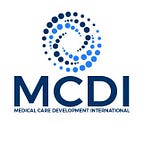Innovations in the Fight Against Cervical Cancer in Myanmar
In Myanmar, cervical cancer is the most common cancer in women aged 15 to 44 years old, and ranks as the second leading cause of female cancer deaths. Estimates for 2012 show that 5,286 new cervical cancer cases were diagnosed annually. Over the past year, MCDI has been providing cervical cancer screening and treatment (CCST) services to women in Yat Sauk Township of Shan State, Myanmar, with over 2,500 women screened so far. Utilizing a one-stop approach and a mobile team, MCDI’s CCST program in Yat Sauk screens women for abnormal cervical lesions, provides immediate treatment for positive cases, and refers patients to a local hospital for further examination and treatment when necessary.
Health workers use visual inspection with acetic acid (VIA) to screen women’s cervixes for abnormalities, and if any lesions are found, they are treated then with cold coagulation. MCDI’s CCST Program was the first to introduce cold coagulation as a cervical cancer preventive treatment in Myanmar. Cold coagulation is an ablative treatment procedure which uses a metallic probe heated to 100–120 degrees Celsius to destroy affected cervical tissue.
MCDI’s program is not only innovative because it is the first of its kind in Myanmar, but also because it has the potential to be replicated by many other programs in low-resource areas around the world currently using cryotherapy. Cold coagulation is more cost-effective than cryotherapy, as cold coagulation uses electricity rather than tanks of gas. Combined, screening and treatment using VIA and cold coagulation takes no longer than 5 minutes, anesthesia is not needed, only minor side effects have been recorded, and recovery times are short.
To ensure the success of this project, MCDI engaged the help of Professor Mya Thida. Dr. Thida is head of the department of Obstetrics and Gynecology at the University of Medicine in Yangon, and has over 30 years of experience as a clinician. She is also Myanmar’s leading expert on cervical cancer. With her team of gynecologists, Dr. Thida trained Ministry of Health (MOH) staff on cervical cancer screening and management. During a multi-day course in November, staff members learned how to conduct cervical cancer screening and treatment, performing over 300 screenings of women during the training period.
The mobile team of MOH staff are implementing community mobilization and screening events throughout Yat Sauk every two weeks, where at least 200 women come to learn and are screened for cervical lesions. Through health education, these events increase awareness amongst rural women about the importance of cervical cancer screening. Women learn about cold coagulation treatment resulting from a VIA positive status, as well as other gynecological problems like cervicitis and cervical polyps, both of which are abnormalities of the cervix. Usually, community mobilization events last for several days. During these events, hundreds of women join in on community activities conducted by local MOH staff, the Myanmar Maternal and Child Welfare Association (MMCWA), and other volunteers including community and religious leaders.
There are an impressive number of women who come to these events wanting to learn more about such intimate health issues. These events demonstrate how important it is to raise awareness in communities surrounding gynecological cancers. The “screen-and-treat” model for cervical cancer using VIA and cold coagulation allows for these screenings to be mobilized in community level programs that have the ability to reach rural and hard-to-reach populations like Yat Sauk Township. MCDI also implements a similar CCST program through hospitals in Equatorial Guinea, which has been able to screen 50–60 women per day using VIA and cold coagulation. With promising results, MCDI looks to expand its programs to bring the positive outcomes of these programs to more areas in need.
